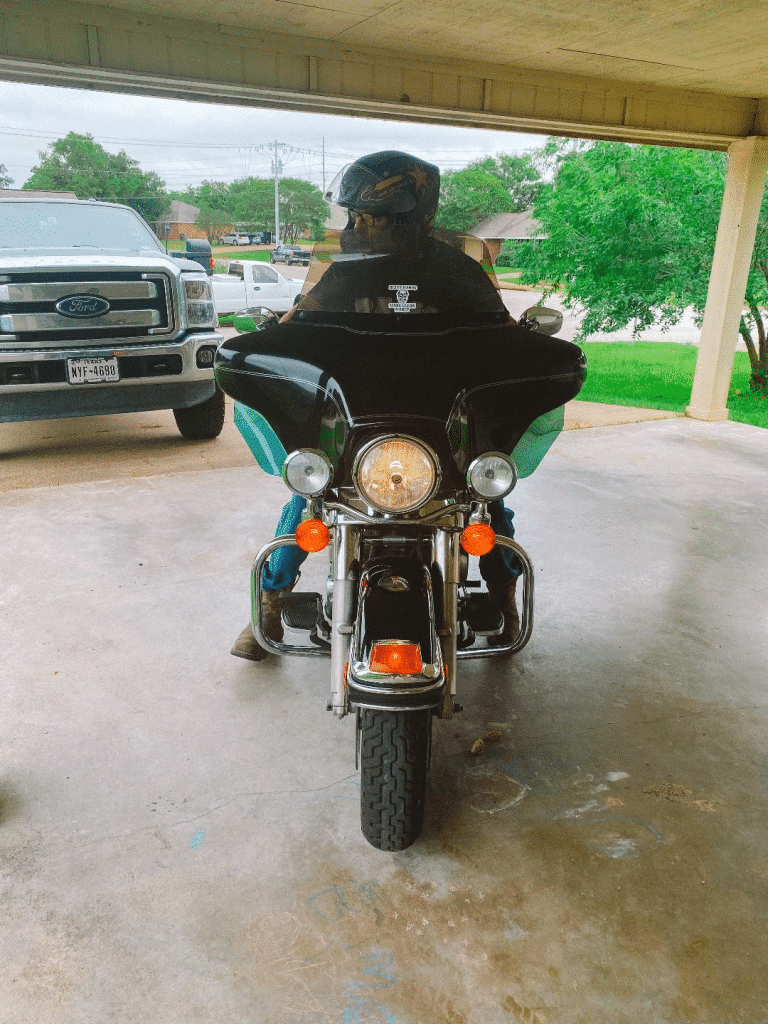Definition of empathy: the ability to understand and share the feelings of another.
My son, Hans, is going to ride his Harley with some friends on Saturday. They are going to Kurten, Texas, for a blessing of the bikes. Hans told me that there will a “priest or pastor or whatever” to say a blessing over the motorcycles. It’s not a far ride from where he lives, so he will probably hook up with some guys to go further. Riding the Harley helps Hans to relax and deal with his PTSD from Iraq. It’s healthy for him to go for long trips on the Harley.
Hans told me about another ride that is going to happen on Saturday. A different group of guys is doing a sort of memorial ride for a 17-year-old biker who died after getting t-boned by a car at an intersection. Hans decided not to go to that one, partly because he’s not very good at expressing emotions. He’s always been kind of impassive and distant that way. Going to Iraq with the Army didn’t help in that regard. Hans described himself as “a callous, kind of an asshole.” I think that Hans would have been okay at that event, but he knows himself best. The ride might have conjured up some memories and feelings that he really doesn’t want to have.
Hans and I talked about it on the phone. He told me, “It’s hard for me to get all worked up about some problems that other people have. Like with homeless people, I was homeless once, and not many people helped me.”
I replied, “Yeah, but some people did help you.”
He said, “I know, but you know what I mean. I went to hell and came back again. It was hard, but I pulled myself together.”
I told him, “You did, but some people can’t. Mental illness or whatever. Some people just can’t.”
He sighed and said, “Yeah.”
Hans and I talked some more, mostly about work. Neither of us has much tolerance for people who we perceive to be lazy and/or stupid. We have (or in my case, had) no empathy for people who couldn’t get the job done. We are very mission-oriented. Hans told me about a former coworker who couldn’t do his job, and Hans told him point blank, “You are a lazy motherfucker.”
That outburst was no doubt satisfying in a cathartic way, but probably counterproductive. Most people don’t see well-intentioned comments like that as constructive criticism.
Ironically, many years ago, I used those same words with one of my coworkers.
Why is Hans the way he is? Partly, it’s his upbringing. Hans told me once that, after growing up with me as a father, basic training was kind of a letdown.
I also think being veterans plays a role here. The military promotes many noble virtues like loyalty, honor, and courage. However, empathy does not usually make the list. Well, I guess empathy is encouraged in a highly selective way. Soldiers are expected to care for their comrades and to protect civilians. However, in a profession that is all about killing people, empathy for our enemies is not helpful.
Vets are also all about the mission. Quit your whining and get it done. We really don’t like people who can’t seem to function. We tend to be hardasses that way.
I think that veterans are often callous after they leave the service, especially combat vets like my son. In the military, a person experiences things that are brutal and perhaps life-threatening. It’s hard to look at the problems of the civilian population without concluding that a lot of it is petty. Becoming emotionally hardened is a protective device that allows a soldier to do things that are traumatic. This is not necessarily a healthy way to be once a person has returned to the outside world.
It takes a long time for a person’s emotions to soften up–if they ever do. It took me decades to be open to the feelings of others and to my own feelings. I am different now than I was 40 years ago. I had to do things like meditation to change inside. Relearning empathy is work.
Empathy comes with a cost. I have a friend from the synagogue who is a very old man. His son died recently from alcohol abuse related to his PTSD from the Soviet war in Afghanistan. I called my friend yesterday. He told me the story of his son’s life, again. Every time we meet or call each other, my friend tells me all about his son. I listen, just listen. I understand his feelings very, very well. I share his grief, and I share his suffering. When he finishes his story, and we leave each other, I cry. Every time. Listening to him hurts me intensely, but it is the only thing I can do to ease his pain.
I hope that Hans has a good ride.

Post Script: Hans changed his mind about riding as an escort to that 17-year-old biker’s funeral. He’s going with the mourners to accompany the casket to the cemetery. I’m proud of him. [Image Credit: Author]
_______________________________
Frank (Francis) Pauc is a graduate of West Point, Class of 1980. He completed the Military Intelligence Basic Course at Fort Huachuca and then went to Flight School at Fort Rucker. Frank was stationed with the 3rd Armor Division in West Germany at Fliegerhorst Airfield from December 1981 to January 1985. He flew Hueys and Black Hawks and was next assigned to the 7th Infantry Division at Fort Ord, CA. He got the hell out of the Army in August 1986.
As the Voice of the Veteran Community, The Havok Journal seeks to publish a variety of perspectives on a number of sensitive subjects. Unless specifically noted otherwise, nothing we publish is an official point of view of The Havok Journal or any part of the U.S. government.
Buy Me A Coffee
The Havok Journal seeks to serve as a voice of the Veteran and First Responder communities through a focus on current affairs and articles of interest to the public in general, and the veteran community in particular. We strive to offer timely, current, and informative content, with the occasional piece focused on entertainment. We are continually expanding and striving to improve the readers’ experience.
© 2024 The Havok Journal
The Havok Journal welcomes re-posting of our original content as long as it is done in compliance with our Terms of Use.


